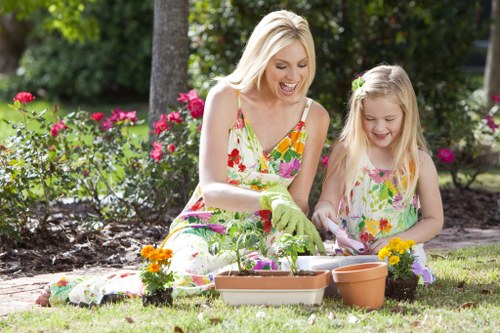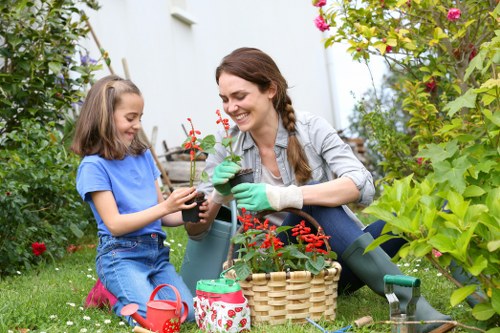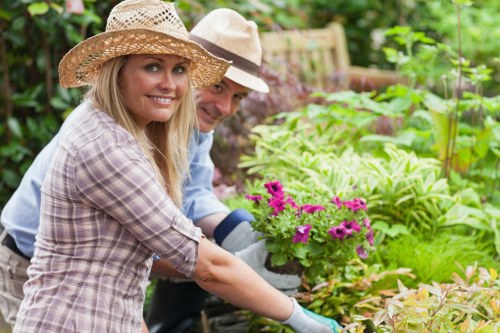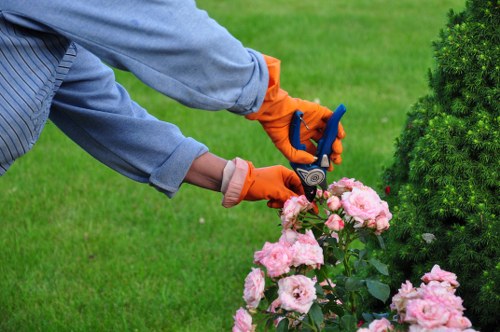Comprehensive Guide to Landscape Gardening in Richmond

Introduction to Landscape Gardening
Landscape gardening in Richmond transforms outdoor spaces into breathtaking environments that reflect personal tastes and enhance property value. Whether you have a sprawling backyard or a quaint balcony, understanding the fundamentals of landscape gardening can help you create a beautiful and functional outdoor area.
Richmond's unique climate and soil conditions offer a diverse range of plants and design opportunities. From vibrant flower beds to serene water features, the possibilities are endless for those looking to enhance their outdoor living spaces.
Embracing landscape gardening not only improves the aesthetic appeal of your property but also contributes to environmental sustainability. By selecting native plants and implementing eco-friendly practices, you can create a garden that is both beautiful and beneficial to the local ecosystem.

Planning Your Landscape Garden
Assessing Your Space
Before diving into landscape gardening, it’s essential to assess the available space. Consider factors such as sunlight exposure, soil quality, and existing structures. Taking accurate measurements and creating a layout plan can help you visualize the end result and make informed decisions.
Richmond's varying regions may have different microclimates, so understanding the specific conditions of your garden area is crucial. This knowledge will guide your plant selection and placement, ensuring that each element thrives in its designated spot.
Additionally, consider the purpose of your garden. Do you want a space for relaxation, entertaining, or growing vegetables? Defining the primary function will influence the overall design and layout.
Selecting Plants
The choice of plants plays a pivotal role in landscape gardening. Opt for a mix of perennials, annuals, shrubs, and trees that complement each other in terms of color, texture, and growth habits. In Richmond, popular choices include azaleas, camellias, and native grasses that are well-suited to the local climate.
Incorporating native plants not only reduces maintenance efforts but also supports local wildlife. These plants are adapted to Richmond’s environment, making them more resilient and easier to care for.
Consider the seasonal changes when selecting plants to ensure your garden remains vibrant throughout the year. Incorporate a variety of blooming periods to maintain continuous color and interest.

Design Elements in Landscape Gardening
Hardscaping Features
Hardscaping refers to the non-living components of your garden, such as patios, walkways, and fences. These elements provide structure and functionality, creating defined spaces for different activities. In Richmond, materials like brick, stone, and wood are popular choices that blend seamlessly with the natural surroundings.
Incorporating hardscaping features can enhance the overall design and provide necessary support for plant life. For example, stone pathways can guide visitors through the garden, while retaining walls can help manage slopes and prevent soil erosion.
Outdoor lighting is another essential hardscaping component. Proper lighting not only highlights key features but also extends the usability of your garden into the evening hours, creating a magical ambiance.
Water Features
Water features, such as ponds, fountains, and waterfalls, add a sense of tranquility and movement to your landscape. They can serve as focal points, drawing the eye and providing soothing sounds that enhance the overall atmosphere.
When designing water features in Richmond, consider the local water regulations and maintenance requirements. Choosing low-maintenance options can ensure that your water feature remains beautiful without excessive upkeep.
Integrating native aquatic plants can further elevate the aesthetic appeal while supporting local biodiversity. These plants help maintain water quality and provide habitat for beneficial insects and wildlife.

Maintaining Your Landscape Garden
Regular Care and Upkeep
Maintaining a landscape garden requires consistent care to ensure that plants remain healthy and vibrant. Regular watering, pruning, and fertilizing are essential tasks that help sustain the beauty and functionality of your garden.
In Richmond, it’s important to adjust your maintenance routine according to the seasons. Spring and summer may demand more frequent watering and fertilization, while autumn and winter focus on preparing plants for colder months.
Implementing a mulching strategy can aid in moisture retention, suppressing weeds, and regulating soil temperature. Organic mulches, such as bark or compost, also contribute to soil health by adding nutrients as they decompose.
Pest and Disease Management
Pests and diseases can pose significant threats to your landscape garden's health. Regular inspections and prompt interventions are crucial to prevent infestations from spreading. Utilizing integrated pest management (IPM) strategies can effectively control pests while minimizing environmental impact.
Beneficial insects, like ladybugs and bees, play a vital role in maintaining a balanced ecosystem. Encouraging their presence through plant selection and habitat creation can naturally reduce pest populations.
Proper sanitation practices, such as removing dead plant material and sanitizing tools, can help prevent the spread of diseases. Selecting disease-resistant plant varieties is also a proactive approach to maintaining garden health.

Enhancing Your Landscape with Sustainable Practices
Water Conservation
Implementing water conservation techniques is essential in sustainable landscape gardening. Using drip irrigation systems and soaker hoses ensures that water is delivered directly to the plant roots, reducing evaporation and waste.
Rainwater harvesting is another effective method for conserving water. Installing rain barrels or cisterns can capture and store rainwater for use during dry periods, minimizing reliance on municipal water sources.
Choosing drought-tolerant plants and xeriscaping can significantly reduce water consumption. These plants are adapted to thrive in low-water conditions, making them ideal for Richmond’s climate.
Soil Health and Composting
Maintaining healthy soil is the foundation of a thriving landscape garden. Regularly adding organic matter, such as compost or manure, improves soil structure, enhances nutrient availability, and promotes beneficial microbial activity.
Composting kitchen scraps and garden waste not only reduces landfill burden but also provides a sustainable source of nutrients for your plants. Creating a compost pile or using a compost bin can simplify the process.
Soil testing is an important step in understanding the nutrient composition and pH levels of your garden soil. This information guides appropriate amendments, ensuring optimal growing conditions for your plants.
Choosing the Right Landscape Gardening Services in Richmond
Professional Expertise
Hiring professional landscape gardening services can significantly enhance the quality and efficiency of your garden project. Experienced landscapers bring valuable expertise in plant selection, design, and maintenance practices tailored to Richmond’s specific environment.
Professional landscapers can help translate your vision into reality, offering creative solutions and innovative designs that maximize the potential of your outdoor space. Their knowledge of local flora and climate conditions ensures that your garden is both beautiful and sustainable.
Moreover, professional services save you time and effort, handling all aspects of the project from initial planning to ongoing maintenance. This allows you to enjoy a stunning garden without the stress of managing every detail.
Cost Considerations
Investing in landscape gardening services involves understanding the costs associated with design, materials, and labor. It’s essential to establish a budget that aligns with your goals and explore various service packages to find the best fit.
Transparent pricing and detailed proposals from landscapers can help you make informed decisions. Comparing quotes and evaluating the scope of services ensures that you receive high-quality work within your budget constraints.
Additionally, consider the long-term benefits of professional landscaping, such as increased property value and reduced maintenance costs, when evaluating the initial investment.
Incorporating Local Culture and Aesthetics
Richmond’s Unique Style
Richmond boasts a rich cultural heritage and diverse architectural styles that can inspire your landscape gardening design. Incorporating elements that reflect the local history and aesthetics creates a cohesive and meaningful outdoor space.
Traditional Southern gardens, with their lush greenery and elegant blooms, are a popular choice in Richmond. Enhancing these classic styles with modern touches can result in a timeless yet contemporary garden design.
Local art and decorative features, such as sculptures or handcrafted garden ornaments, add personality and character to your landscape. These elements can serve as focal points, enhancing the overall visual interest of your garden.
Community and Sustainability
Participating in local gardening communities and initiatives fosters a sense of belonging and shared responsibility for Richmond’s natural beauty. Engaging with community gardens or attending local gardening events can provide inspiration and support for your own landscape projects.
Emphasizing sustainability in your garden design contributes to the overall health of Richmond’s environment. Practices like using native plants, reducing chemical usage, and implementing energy-efficient irrigation systems align with community values and promote ecological balance.
Collaborating with local nurseries and suppliers ensures that you are sourcing plants and materials that are well-suited to Richmond’s climate, supporting local businesses and reducing your garden’s carbon footprint.
Seasonal Considerations for Landscape Gardening
Spring Gardening Tips
Spring is an ideal time to kickstart your landscape garden in Richmond. As temperatures rise and daylight increases, it’s the perfect season for planting new flowers, shrubs, and trees.
Preparing the soil by adding compost and mulch in spring provides a fertile foundation for your plants. This also helps in retaining moisture and suppressing weed growth during the growing season.
Spring cleaning your garden by removing debris and pruning dead or damaged branches creates a clean slate for new growth. This maintenance step is crucial for the health and appearance of your landscape.
Summer Maintenance
Summer brings the challenge of maintaining your garden amid higher temperatures and potential drought conditions. Implementing efficient watering practices, such as early morning or late evening irrigation, ensures that plants receive adequate moisture without excessive evaporation.
Mulching heavily during summer helps in conserving soil moisture and regulating temperature, protecting your plants from the heat. Regularly checking for pests and diseases also becomes more critical during this season.
Pruning and deadheading spent flowers not only keeps your garden looking tidy but also encourages continuous blooming throughout the summer months.
Conclusion
Landscape gardening in Richmond offers endless opportunities to create beautiful, sustainable, and personalized outdoor spaces. By understanding the local climate, selecting appropriate plants, and incorporating essential design elements, you can transform your garden into a stunning retreat.
Whether you're a seasoned gardener or just starting, investing time and resources into landscape gardening can yield significant rewards in terms of aesthetic appeal, property value, and personal satisfaction.
Ready to transform your outdoor space? Contact us today to start your landscape gardening journey in Richmond!

